Bir WordPress web sitesi kurarken, bazen insanlar sitelerini yanlışlıkla ‘wordpress’ adlı bir klasörde oluştururlar. Bu, web sitenizin adresinin ortasında “/wordpress/” ile garip görünmesine neden olabilir. http://www.yoursite.com/ yerine http://www.yoursite.com/wordpress/ gibi görünebilir .
Yıllar içinde birçok okuyucumuz bize bu sorunu nasıl çözeceklerini sordu. Web sitenizin adresinde /wordpress/ olması profesyonelce görünmeyebilir ve ziyaretçilerinizin kafasını karıştırabilir.
Bu makalede, site URL’nizden /wordpress/ ‘i nasıl kaldıracağınızı, web sitenizin adresinin temiz ve profesyonel görünmesini ve insanların hatırlamasını nasıl kolaylaştıracağınızı göstereceğim.
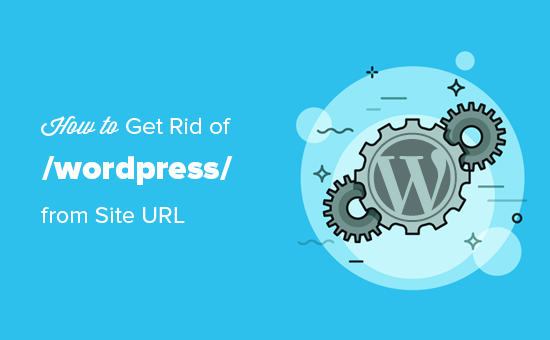
Not: Bu eğitimde gösterilen yöntem diğer alt dizinler için de geçerlidir.
Web Sitemin URL’sinde Neden /wordpress/ Var?
WordPress’in kurulumu oldukça kolaydır ve çoğu WordPress barındırma şirketi, barındırma kontrol panellerinde hızlı WordPress yükleyicileri sunar.
Ancak, WordPress web sitelerini manuel olarak kuran bazı yeni başlayanlar, yanlışlıkla bir alt dizine kurabilirler. Çoğu zaman bu alt dizin ‘wordpress’ olarak adlandırılır.
Bu genellikle kullanıcıların resmi WordPress.org indirmesi içinde buldukları wordpress klasörünü yüklemelerinden kaynaklanır.
Şimdi bunu nasıl kolayca düzeltebileceğinize ve sitenizin URL’sinden /wordpress/ ‘i nasıl kaldırabileceğinize bir göz atalım. Üç yöntemi ele alacağız ve kullanmak istediğinize atlamak için bu bağlantıları kullanabilirsiniz:
Yöntem 1: Yeni Bir WordPress Kurulumu ile Baştan Başlayın
WordPress’i yeni kurduysanız ve web sitenizde hiç içerik yoksa, devam edip baştan başlayabilirsiniz.
WordPress ‘i düzgün bir şekilde yeniden yüklemek için mevcut kurulumu silin ve WordPress yükleme eğitimimizdeki talimatları izleyin.
Web sitenize zaten içerik eklediyseniz, sitenizin URL’sinden /wordpress/ ifadesini kaldırmanın iki kolay yolu vardır. Bunları Yöntem 2 ve 3’te ele alacağız.
Yöntem 2: WordPress Site Adresinizi Değiştirin
Eğer kurulu bir WordPress siteniz varsa, bu yöntem daha kolay ve hızlıdır. Bu yöntemin dezavantajı, resimler gibi medya dosyalarınızın URL’lerinde hala /wordpress/ kullanacak olmasıdır.
İlk olarak, WordPress yönetici alanınıza giriş yapmanız ve Ayarlar ” Genel bölümüne gitmeniz gerekir. ‘WordPress Adresi’ ve ‘Site Adresi’ alanlarının her ikisinin de aynı URL’ye sahip olacağını fark edeceksiniz.
‘Site Adresi’ seçeneğini değiştirmeniz ve kök alan adınıza yönlendirmeniz gerekir, örneğin http://www.example.com ve ‘WordPress Adresi’ seçeneğini olduğu gibi bırakın.
Bunu yaptıktan sonra, ayarlarınızı kaydetmek için ‘Değişiklikleri Kaydet’ düğmesine tıklayın.
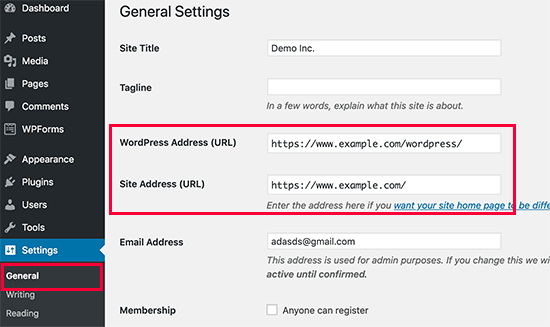
Ardından, bir FTP istemcisi kullanarak web sitenize bağlanmanız gerekir. Oraya vardığınızda, /wordpress/ dizinine gidin ve .htaccess ve index.php dosyalarını bilgisayarınıza indirin.
Eğer .htaccess dosyasını bulamıyorsanız, FTP istemcinizi gizli dosyaları göstermeye zorlamanız gerekebilir. Filezilla kullanıyorsanız, menü çubuğundan Sunucu’ya tıklamanız ve ‘Gizli dosyaları göstermeye zorla’ seçeneğini seçmeniz gerekir.
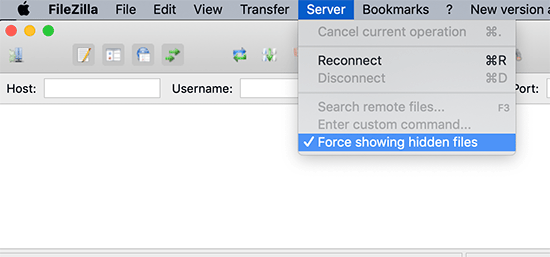
Her iki dosyayı da bilgisayarınıza indirdikten sonra, index.php dosyasını Notepad gibi bir metin düzenleyicide açmanız gerekir. Bu dosyada şuna benzer bir satır bulacaksınız:
1 | require( dirname( __FILE__ ) . '/wp-blog-header.php' ); |
Bu satır, WordPress sitenizi yüklemek için gerekli olan wp-blog-header.php dosyasını yükler.
Şimdi yapmanız gereken, mevcut satırı bununla değiştirerek dosyanın doğru konumunu girmektir:
1 | require( dirname( __FILE__ ) . '/wordpress/wp-blog-header.php' ); |
Değişikliklerinizi kaydedin ve hem index.php hem de .htaccess dosyalarını masaüstü bilgisayarınızdan FTP kullanarak alan adınızın kök dizinine yükleyin.
Kök klasör, içinde ‘wordpress’ klasörü bulunan ana klasördür ve genellikle /www/ veya /public_html/ olarak adlandırılır.
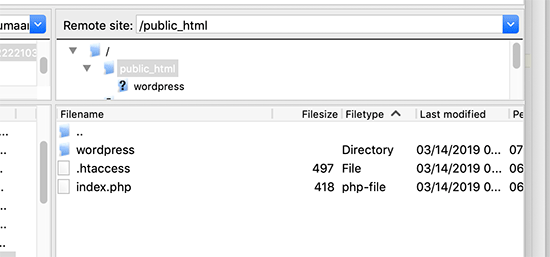
Hepsi bu kadar. Artık kök alan adını kullanarak web sitenizi ziyaret edebilirsiniz ve her şey yolunda gidecektir.
1 | http://example.com |
Ancak, WordPress yöneticinize giriş yapmanız gerekiyorsa, yine de ‘wordpress’ dizini içindeki wp-admin’e şu şekilde gitmeniz gerekecektir:
1 | http://www.example.com/wordpress/wp-admin |
Yöntem 3: WordPress’i Kök Dizine Taşıma
Bu yöntem daha kapsamlıdır ve WordPress sitenizi alt dizinden web sitenizin kök klasörüne kalıcı olarak taşıyacaktır.
Adım 1: Bir Çoğaltıcı Paketi Oluşturun
Öncelikle, web sitenize ücretsiz Duplicator eklentisini yüklemeniz ve etkinleştirmeniz gerekir. Daha fazla ayrıntı için, bir WordPress eklentisinin nasıl kurulacağına ilişkin adım adım kılavuzumuza bakın.
Not: Bu eğitim için Duplicator’ın ücretsiz sürümünü kullanacağız. Ancak, sınırsız yedekleme, zamanlanmış yedekleme, sürükle ve bırak içe aktarma ve daha fazlasını elde etmek için Duplicator Pro ‘ya yükseltebilirsiniz.
Etkinleştirmenin ardından, Duplicator ” Yedekler sayfasını ziyaret etmeniz ve ardından ‘Yeni Oluştur’ düğmesine tıklamanız gerekir.
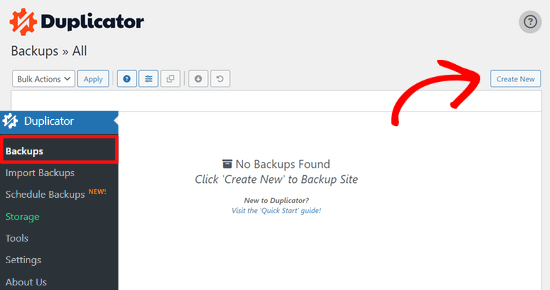
Bu, web sitenizin tamamının bir yükleyici paketini oluşturacak olan Duplicator sihirbazını başlatacaktır.
Yedeklemeniz için bir ad ekleyebilir ve devam etmek için ‘İleri’ düğmesine tıklayabilirsiniz.
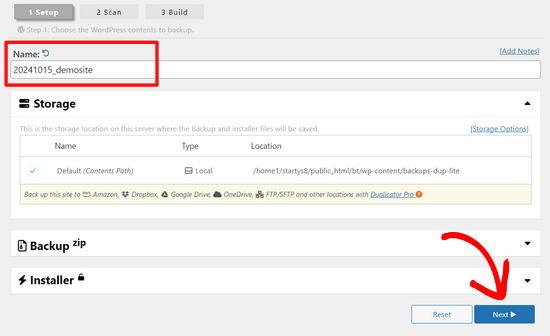
Ardından, eklenti bazı taramalar yapacaktır. Her şey iyi görünüyorsa, alttaki ‘Oluştur’ düğmesine tıklayabilirsiniz.
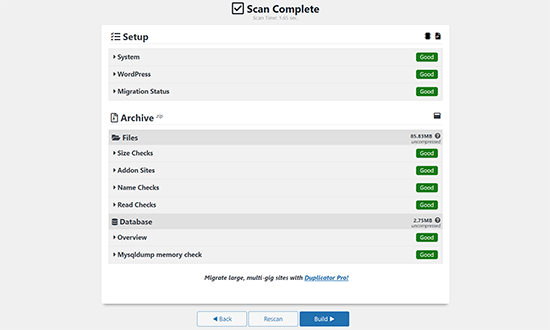
Duplicator şimdi bir paket oluşturacak ve yükleyici komut dosyasıyla birlikte indirmenizi isteyecektir.
Devam edin ve ‘Her İki Dosyayı da İndir’ düğmesine tıklayarak her iki dosyayı da bilgisayarınıza indirin.
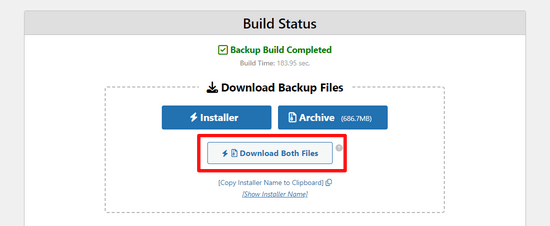
Adım 2: Yeni WordPress Kurulumu için Yeni Bir Veritabanı Oluşturun
Mevcut WordPress veritabanını kullanabilirsiniz, ancak eski veritabanınızın güvende ve değişmemiş olması için yeni bir tane oluşturmak daha iyidir. Bu şekilde, bir şeyler ters giderse çok fazla telaşlanmadan sitenize geri dönebilirsiniz.
Hosting hesabınızın cPanel kontrol panelini ziyaret etmeniz, ‘Veritabanları’ bölümüne gitmeniz ve ardından ‘MySQL Veritabanları’ simgesine tıklamanız gerekir.

Bundan sonra, veritabanınız için bir ad vermeniz yeterlidir.
Ardından, ‘Veritabanı Oluştur’ düğmesine tıklamalısınız.

cPanel şimdi sizin için yeni bir veritabanı oluşturacaktır. Bundan sonra, ‘MySQL Kullanıcıları’ bölümüne ilerlemeniz gerekir.
Buradan, yeni veritabanı kullanıcınız için bir kullanıcı adı ve şifre sağlamanız ve ‘Kullanıcı Oluştur’ düğmesine tıklamanız gerekir.
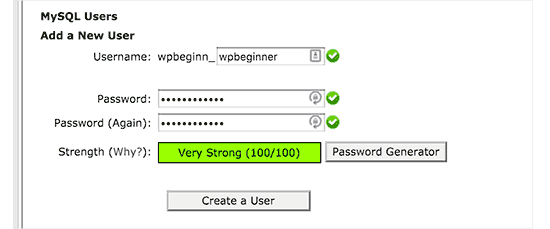
Şimdi, yeni kullanıcıya veritabanı izinleri atamanız gerekir.
‘Veritabanına Kullanıcı Ekle’ bölümüne ilerleyin. ‘Kullanıcı’ alanının yanındaki açılır menüden oluşturduğunuz veritabanı kullanıcısını seçin, ardından veritabanını seçin. Son olarak, ‘Ekle’ düğmesine tıklayın.

Yeni veritabanınız artık yeni WordPress kurulumu için kullanılmaya hazırdır.
Adım 3: Çoğaltıcı Sihirbazını Çalıştırın
Şimdi, Duplicator arşiv paketini ve daha önce indirdiğiniz yükleyici dosyasını web sitenizin kök dizinine yüklemeniz gerekir.
Bu,/wordpress/ klasörünü içeren dizin olacaktır.
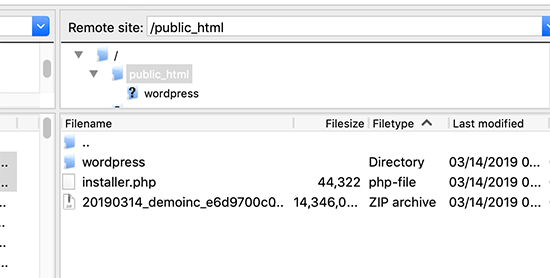
Her iki dosyayı da yükledikten sonra, yükleyici komut dosyasını bir tarayıcı penceresinde açın. Sitenizin kök URL’sini girmeniz ve ardından /installer.php ile öneklemeniz gerekecektir.
1 | https://example.com/installer.php |
Bu, Duplicator yükleyici sihirbazını açacaktır.
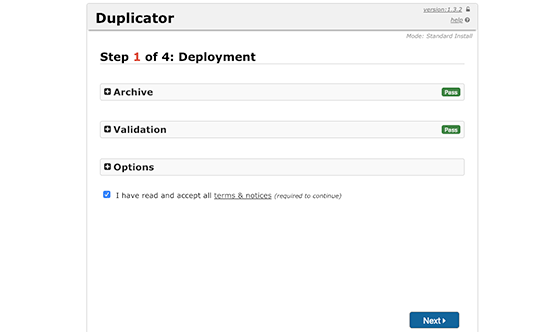
Şartlar ve koşullar kutusunu işaretleyin ve ardından devam etmek için ‘İleri’ düğmesine tıklayın.
Ardından, sizden veritabanı bilgilerini girmenizi isteyecektir. Daha önce 2. adımda oluşturduğumuz veritabanı için bilgileri girin.
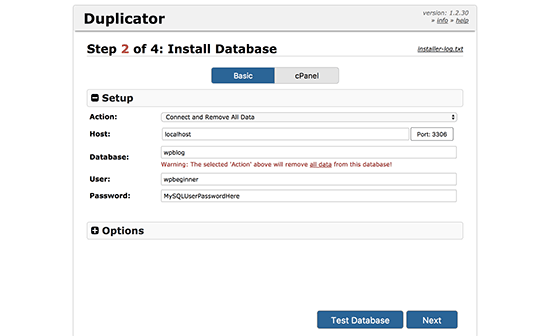
Veritabanı bilgilerini girdikten sonra, devam etmek için ‘İleri’ düğmesine tıklayın. Duplicator şimdi WordPress veritabanı yedeğinizi arşivden yeni veritabanınıza açacaktır.
Ardından, sizden site URL’sini ve yolunu güncellemenizi isteyecektir. Yeni URL ve yolu otomatik olarak algılayacağı için burada bir şey yapmanıza gerek yoktur. Ancak, algılamazsa, ayrıntıları buraya manuel olarak girebilirsiniz.
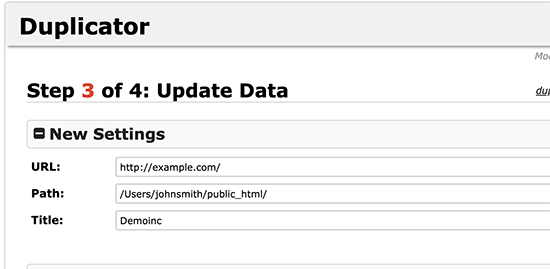
Duplicator şimdi geçişi tamamlayacaktır.
Web sitenize yeni konumdan erişmek için ‘Yönetici Girişi’ düğmesine tıklayabileceksiniz.
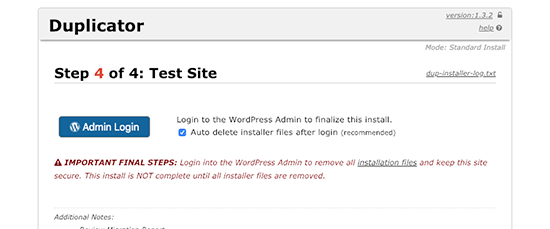
Adım 4: Alt Dizinden Kök Klasöre Yönlendirmeleri Ayarlayın
Tebrikler, WordPress sitenizi alt dizinden kök klasöre başarıyla taşıdınız.
Şimdi, kullanıcılarınızın ve arama motorlarının web sitenizin yeni konumunu bulabilmesi için yönlendirmeleri ayarlamanın zamanı geldi.
Öncelikle, bir FTP istemcisi kullanarak WordPress sitenize bağlanmanız ve ardından eski /wordpress/ klasörünü silmeniz gerekir.
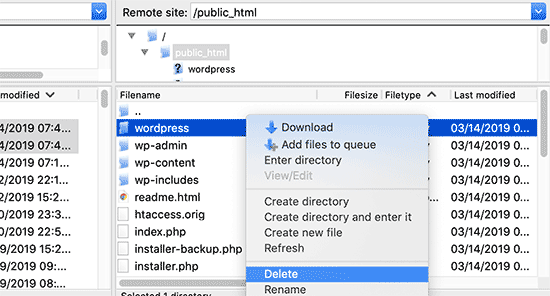
Bundan sonra, WordPress sitenizin yönetici alanına geçin. Web sitenizin kök dizinine taşıdığınız için WordPress yönetici URL’niz şu şekilde olacaktır:
1 | https://example.com/wp-admin |
Şimdi, Yeniden Yönlendirme eklentisini yüklemeniz ve etkinleştirmeniz gerekir. Daha fazla ayrıntı için, bir WordPress eklentisinin nasıl kurulacağına ilişkin adım adım kılavuzumuza bakın.
Etkinleştirmenin ardından Araçlar ” Yeniden Yönlendirme sayfasını ziyaret etmeniz gerekir. Eklenti şimdi size bir kurulum sihirbazı gösterecektir. ‘Kuruluma Devam Et’ ve ardından ‘Kurulumu Bitir’ düğmelerine tıklamanız yeterlidir.
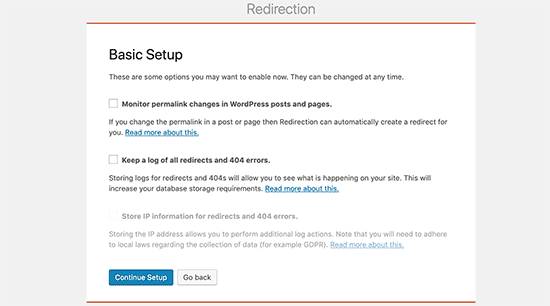
Ardından, ‘Yönlendirmeler’ sekmesine geçmeniz ve yeni yönlendirmenizi eklemeniz gerekir.
Öncelikle, ilk alanın köşesindeki ‘Regex’ kutusunu işaretlemeniz gerekir.
Bundan sonra, ‘Kaynak URL’ alanına gidin ve https://example.com/wordpress/adresini ekleyin .* Ardından, ‘Hedef URL’ alanına gidin ve https://example.com/$1 adresini ekleyin.
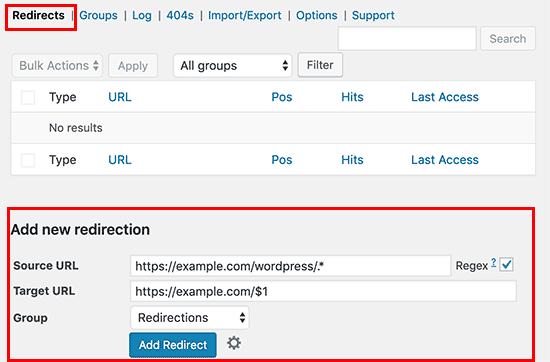
‘example.com’ yerine kendi alan adınızı yazmayı unutmayın. Ardından, değişikliklerinizi kaydetmek için ‘Yönlendirme Ekle’ düğmesine tıkladığınızdan emin olun ve işiniz bitti.
Yazıları ve sayfaları yeniden yönlendirmek için kullanabileceğiniz bir başka araç da All in One SEO’dur (AIOSEO). WordPress’te tam site yönlendirmelerinin nasıl yapılacağına ilişkin başlangıç kılavuzumuzda /wordpress/ içeren eski URL’leri kullanan ziyaretçileri yeni site konumunuza nasıl yönlendireceğinizi gösteriyoruz.
Ayrıca, kırık bağlantıları yakalamak için 404 hata izlemeyi etkinleştirebilirsiniz, böylece anahtar kelime sıralamalarını kaybetmezsiniz.
Şu andan itibaren, URL’de /wordpress/ ile web sitenize erişmeye çalışan tüm kullanıcılar, yeni kök URL’nizle otomatik olarak doğru gönderilere yönlendirilecektir.
WordPress’te URL’leri Değiştirme Konusunda Uzman Kılavuzları
Umarız bu makale WordPress sitenizin URL’sinden /wordpress/ ‘i nasıl kaldıracağınızı öğrenmenize yardımcı olmuştur. WordPress’te URL’leri değiştirmekle ilgili diğer bazı kılavuzları da görmek isteyebilirsiniz:
- WordPress Site URL’lerinizi Nasıl Değiştirirsiniz (Adım Adım)
- WordPress Sitenizi Taşırken URL’leri Kolayca Güncelleme
- WordPress URL’lerinden Rakamlar Nasıl Kaldırılır
- WordPress URL’lerinden Tarih Nasıl Kaldırılır
- WordPress URL’lerinden v=XXXX Dizesi Nasıl Kaldırılır
- WordPress’te Alt Sayfa URL’sinden Üst Slug Nasıl Kaldırılır
- WordPress’te Varsayılan Arama URL Slug’ı Nasıl Değiştirilir?
- WordPress’te Özel Giriş URL’si Nasıl Eklenir (Adım Adım)
- Yeni Başlayanlar İçin Rehber: WordPress Giriş URL’nizi Nasıl Bulursunuz?
- WordPress HTTP’den HTTPS’ye Nasıl Doğru Şekilde Taşınır (Başlangıç Kılavuzu)
If you liked this article, then please subscribe to our YouTube Channel for WordPress video tutorials. You can also find us on Twitter and Facebook.





JO
Thank you so much for this – it worked and as a total WP novice I can’t believe I did it myself! You’re awesome
WPBeginner Support
Hey JO,
We are glad you found it helpful
You may also want to subscribe to our YouTube Channel for WordPress video tutorials.
Admin
Sandip
Thanks so much for this. I did install WP into a subdirectory and then spent a week remaking the site so that it was installed in the root directory At least now I know better after reading your tutorial.
At least now I know better after reading your tutorial.
Temitope
Hello, Thanks for the tutorial, I’m pretty new to WordPress, I did a one click install and it was a multisite installation too. The website URL and domain URL fields are’nt available under settings. Please how do I go about this on a multisite???
Rogue
Wonderful tutorial, worked perfectly, thanks man
Tobi
Hi, great article, the first one I found which explains this topic in a good matter.
I have a similar problem, but a little bit more tricky. I do not know how it happened, but certainly I have done something strange at the WP installation. If I check my homepage it is actually in another extra worpress folder, that means I have WP in another WP folder, so my homepage looks like this: “www.example.com/wordpress/wordpress”. in the filemanager in the frp client i can see in the public_html two folders of wordpress. I did not move yet the wordpress folder with the content one level up and actually eliminate the other folder, because I am worried that I will mass it up.
Has anybody have an idea what would be the best solution? So I actually get the homepage opened under: “www.example.com” and not “www.example.com/wordpress/wordpress”?
thanks for any good hint/solution.
Brandi
Thank you so much for this!! I did everything you said to do, and almost everything works. There’s just one page that stopped working and is returning a 404 error page. Can you help? Thanks!
Krista Hagman
I tried, but the space that says Website Address and site address does not exist in my General area in Settings.
Is there another way to do it?
Carolina
I see that several have the same problem as me, but I can not see any response to the issue.
That is that everything seems to work fine except for:
the home-page which is still directing to site.com/wordpress and therefore shows a 404 page.
I did try to delete the htaccess file from the root directory and update the url-structure. it created a new htaccess file but the problem still is the same..
Would really appreciate your response to this!
Thank you for a great post.
may
My problem was from menu
Try to check your URL from WP-admin —>>> appearance —>>> menu —>>> home —>>> custom link URL
Anna Acenas
hello
how can i remove my blog Im not a the owner of a site can i still remove my blog even im not the owner.please help me
John
I have a question, is there something like this for Joomla? Because I couldn’t find anything on the internet.
Amardeep gupta
Hello,
First of all thanks for this article. But there is one problem stand for me.
As I followed your step as you mention so i got Index.php but didn’t find .htaccess file.
But i did same mean
change ‘/wp-blog-header.php’ to ‘/wordpress/wp-blog-header.php’
but my home page only show without /wordpress and rest of pages will show 404- error.
please help me to slove this problem.
Avinash
It is not working me
Ashok Kumar
I have two domains in a single account. and so two wordpress installations in two subfolders. In this case, is it possible to move index.php and .htaccess of both sites to same root directory. If not what to do ?
Shady
You can make use of vhost go in the conf of ur webhost and do something like:
DocumentRoot D:/webserver/htdocs/domain1ServerName domain1.omServerAlias www.domain1.comDocumentRoot D:/webserver/htdocs/domain2ServerName domain2.omServerAlias www.domain2.comThis will make the subfolder the root for the domain you want to
Anna
Gah! I followed the steps and it was fine. Then I went to permalinks, hit save changes and it broke! I’m getting a 500 error message! Please help me! I need to fix it! Thank you x
Shady
Still have the same problem? I can help you
shamsher khan
HI, everyone, i have an urgent query that
my client website a news website now we want to launch Hindi and Urdu version of news so
we decided to create a folder in
public_html/www.example.com/hi
public_html/www.example.com/ur
public_html/www.example.com/fr
and install wordpress
But we want our site url should be like this:
http://www.example.com/hindi/article-title-slug
http://www.example.com/urdu/article-title-slug
is this possible and if yes then how can i do it plz help
WPBeginner Support
It is possible. There are multiple ways to do this. You can consider creating a multilingual WordPress site. This will eliminate maintaining separate WordPress installs.
You can also go installing multiple WordPress instances in separate directories for each language. You will have to setup redirects in .htaccess file.
Admin
Janaina Moraes
You are great! Thanks so much for helping! =)
Janaina Moraes
Hello! Thanks for the tutorial, that’s exactly what I needed.
However, when trying to follow the steps, I realised that I don’t have the index.php file in my /wordpress/ directory. Is that weird? I can see the .htaccess, but the index.php is not there!!!
Can you help me please?
Thank you so much!
Janaina Moraes
Sorry, already found it! I’ll try the steps and get you update about the results! Thanks!!!!
John Woodcock
This worked but now the admin bar is not visible when navigating the site. One of the perks of WordPress is the ability to easily navigate and edit pages. How can I add the admin bar back to the site?
Kerry
This worked so well for me – thank you so much
Guy Riems
Hi,
I executed al these steps and it works great except for my home-page.
When accessing my home-page the /wordpress is still appended to the url, but the page is no longer found. All other pages are working fine.
My first thought was to deactivate all plugins, but that didn’t help. No matter what I am doing, still getting that error.
Any advice would be great !
WPBeginner Support
You can try these steps:
Connect to your website using an FTP client. In the root directory you will find a .htaccess file. Download it to your computer. Delete the original file from your website. Visit your site’s admin area and go to Settings » Permalinks. Do not change any settings on the page, just click on the save changes button. Check your website to see if the error has resolved.
Admin
Not working
HI, I have followed these instrucs to the letter, too….. the home page url still loads as example.com/wordpress and I get a 404 error. Subpages work just fine, it is the home page. Tried the above suggestions but still receiving 404 error. Any other suggestions?
Guy Riems
Well, I finally found the issue why wordpress was still appended to the URL of my homepage only. In the document root there was a index.html containing a permanent redirect to
mysite/wordpress. I am using Apache as webserver; the default search-order for Apache is index.html before index.php.
Karan
Thank you so much for pointing out the Apache issue. I too have an index.html file. How did you fix your issue ?
Kevin
Thanks a lot for that! You saved me a lot of hassle!
Margaret
Thank you for all the great tutorials, they have been enormously helpful as a beginner to WP. On this one I have followed all the instructions to the letter but get a blank screen when making the changes. I have resorted to redirecting to /wordpress for the time being so that the site remains active. Any clues?
WPBeginner Support
No clue, but you can try deactivating all plugins and switch to a default theme, then follow the instructions.
Admin
daniel
Hi, Dear.
I installed wordpress using install.exe and the wordpress directory exist under the C:/xampp/apps/.
I uploaded the source to host server.
I uploaded my source under domainanme_dir/wordpress.
Now I want to enter my web site using “domainname/wordpress”.
So I followed your instructions to get rid of wordpress.
But When I did, I saw only blank page.
How can I solve this?
WPBeginner Support
Please follow the steps mentioned in the article above.
Admin
Amanda
Thanks so much for the thorough details. Worked well, but only the second time after some investigating of the problem. My root directory had /wp not /wordpress so I had to edit the index.php file with ….
require( dirname( __FILE__ ) . ‘/wp/wp-blog-header.php’ ); instead of
require( dirname( __FILE__ ) . ‘/wordpress/wp-blog-header.php’ );
Many thanks.
gemma
thanks Amanda- went through the whole process like you did with no joy, until i saw your comment- all fixed!
Daisy
Hi, how do i add subfolders for the menus in my site. i want my menus eg the menu SHOP to have example.com/Shop as its address
WPBeginner Support
WordPress does not have subfolders. It does have parent and child pages. For example, your shop page can have address like example.com/shop and it can have a child page like example.com/shop/clothing. You can also add child items to any item in the navigation menu regardless of its content type. See our tutorial on how to add navigation menus in WordPress.
Admin
Sakariyau Bolaji Abass
Thanks admin……but one more thing,and it’s that; i am a free wordpress user meaning that my url still has .wordpress.com but trying to remove it as thought could not be done as the boxes to change the url were not included. Help me out please.
NIGERIA
WPBeginner Support
Please see our guide on the difference between WordPress.com and WordPress.org
Admin
Meghan
Great tutorial! Saved me a lot of time. Thank you.
Fabio
Em… I think I broke something by following this tutorial…
Last night I did th exact steps in this article and it worked – my WP page was no longer under /wordpress but in myname.com. However when I tried to login and access my dashboard this morning I got a database error saying “Error establishing a database connection”. Now I’m desperate.
What did I do? I’ve just downloaded the htcaccess and the index.php file and edited them as you showed. To fix the problem I also tried to re-download the files, roll them back as they were (I re-set the index file to wp-blog-header) and upload them but with no luck.
Anyone can help me understanding what I could have done?
noushin joudzadeh
wow it was great. thanx a lot. you saved me
IT PETE
For those of you still suffering problems when you do this, don’t forget after making the changes and uploading the files back to the web server, to log into the admin area, go to “Settings” then “Permalinks” and simply hit “Save Changes” to update your Permalink Structure.
Cer3bel
if i have a hosting acount and 5 folders with wordpress instalation inside and i have:
how i remove from all site the subfolder from url
Luciano
Please, help me. I’m in trouble.
I did this procedure, step by step. I’m sure I did it as you suggest.
Everything works… but the home page still points to my /wp subfolder.. so I get 404 error.
I’m going mad. Two days trying to solve this.. but no success.
Vivek Padhye
Hi, I dont want to redirect /blog/ to root. I want to access my static pages in root and use wordpress only as a blog. But I need xml sitemaps to show every pages from static pages in root to dynamic in /blog folder. Is there any way i can achieve this.?
LisaT
my general settings only shows the site title and tagline. do not have the wordpress address or site address do I need to upgrade to see it??
do I need to upgrade to see it??
Birgitta
Great article, thank you. I have one question. I have done the above steps, but when I use 301-plugins they will add ‘wp’ into the url. How can I prevent this?
Neil
my settings general page has no boxes for web addresses?!
pumpkinpie
I don’t know what I am doing wrong. This is so confusing.
pumpkinpie
This didn’t work for me
Umer Iftikhar
Good Tutorial! I am facing this step first time as I installed my client’s website in a sub directory. Followed method. Thanks.
WPBeginner Staff
Deactivate all plugins on your site, and see if this solves your issue. Report back if it doesn’t and we can troubleshoot.
Monica
Thanks so much for a great post. I hope there is still support for this even though it is about 2 months old!
I do have one question. On my main wordpress parallax page there is no /wordpress. However, I created a new page (for a form submission) and the menu nav bar changes the link location once that new page is open.
Normally since it is a one page parallax on the main home page it works fine, but once you go to the new page, all the buttons on the nav bar change and have a /wordpress/ gets added in between the address (and results in a 404 page error). For example http://www.texample.com/wordpres/blog. But on the main home page when you click on blog the address is http://www.example.com/blog. I made the changes mentioned above, but still can’t seem to solve the problem. What are your thoughts? Thank you in advance!
eoms
So what am I supposed to change in the htaccess file?
leo
Just nothing. You download index.php and .htaccess files from to WordPress installation folder. You make the correction only to the index.html file. Then you upload both files to the root folder of your site. Done.
Susanna Perkins
For me this is just part of a normal WordPress install. I find it tidier to install wordpress in a subdirectory. I know others who do so as well. There’s nothing “accidental” about it.
Mitch
I agree Susanna! I purposefully always install WordPress to a subfolder. Keeps it cleaner that way. Especially when designing websites that are NOT WordPress driven, but WordPress is used for a only for a blog or some other specific purpose.
Agustin
Thanks for the post it works Really good!!
I change it on my site http://filmarte.ec/wordpress/ to http://filmarte.ec/ it did work well, but i had problems with the translation pluguin that i installed WPML plugin to translate my site to english.
The problem is with the plungin becouse when i change my site to the root folder and click to the translation flag it goes to the url “http://filmarte.ec/en/” but it doesnt load the translation, so i have to get back and when it loads to “http://filmarte.ec/wordpress/en/” it loads the tranlated site well
Please if you could give me any guide or help?
Thanks
Best regards
WPBeginner Support
Please contact the plugin authors and let them know that you have WordPress installed in a subdirectory. They will be able to tell you how to fix this.
Admin
Agustin
Thanks a lot i will!! by the way thanks for the reply
ajit
Does it work with WordPress Multi site setup ?
i have My WordPress installed in sub-directory, folder name “home”
http://www.example.com/home/
http://www.example.com/home/jobs/
http://www.example.com/home/store/
so this will be final path, after following above trick ?
http://www.example.com/
http://www.example.com/jobs/
http://www.example.com/store/
or there will be an issue doing this on WP Multi site setup ?
or is there any way around…
Rags Hopkins
Thanks so much for this. I did install WP into a subdirectory and then spent a week remaking the site so that it was installed in the root directory At least now I know better after reading your tutorial.
At least now I know better after reading your tutorial.
Mehedi Hasan
Very useful blog.Thanks for sharing.I like it!
Steven Boocock
Thanks for the tutorial. I have tried to force the .HTACCESS file from filezilla but it will not show up.
It is a new installation. When I change the mysite.com/wordpress to mysite.com and view my site it takes me to my server home page.
do I have to change any of the permalink structures to create the HTACCESS file.
This issue has been a bug bear for some time now I only want people to search for stevenboocock.com
Ta Steven
WPBeginner Support
If you just installed WordPress then it is possible that there is no .htaccess file to show. WordPress only generates .htaccess file when you are using pretty permalinks.
Admin
m07
If this is the case, then what other files do I need to transfer aside from the index.php?
Brett
FYI- this worked great in terms of moving everything to the root, BUT it can cause many problems with plugins… as it did for me. I had to immediately switch back due to this.
WPBeginner Support
Nope, it will not cause any problems with your plugins. Any issues you may have faced could have been unrelated to these settings.
Admin
Dan Carr
Great article!
I have a question though… If people wanted to visit my blog index page then previously they would have had to go to http://www.mydomain.com/wordpress . If this change was made as described in the article, would people now have to visit http://www.mydomain.com to see the blogs same front page?
Would this change all the post URL from mydomain.com/wordpress/my_post to mydomain.com/my_post ?
WPBeginner Support
Yes, people will be able to read your blog on the root of your domain. Yes, it will take care of Post URLs and will redirect users to correct posts on the root domain.
Admin
faith
Hi there –
Thanks for the easy to understand article! My only problem is that though I no longer have /wordpress at the end of my domain name, all my links still go to http://www.domain.com/wordpress/link. How do I redirect all these links to get rid of the /wordpress?
Mindy
Does this mean I do not have to buy the .com from some place like godaddy? I can have a .com just by removing the word, wordpress?
WPBeginner Support
If your site is already on an address like this:
http://www.example.com/wordpress, then you do not need to register another domain name you can just get rid of the wordpress and your site will be available to your readers on the main domain. i.e.http://www.example.comAdmin
Ujjwal
Greats this works. But the problem occurs when I am trying to install Yoast plugin. When I make the changes as described above, plugin does not get installed. Please suggest.